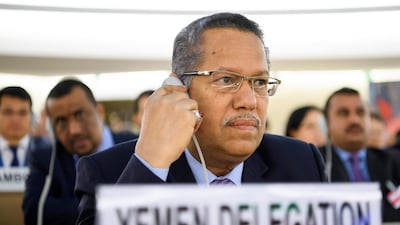Yemeni President Abdrabu Mansur Hadi has fired his prime minister citing "negligence" and economic mismanagement, replacing him with technocrat Maeen Abdulmalik Saeed.
Mr Hadi accused the now former prime minister, Ahmed Bin Dagher, of negligence that he said precipitated a financial crisis, a falling currency and delays in paying public sector staff.
"This [dismissal] was a result of negligence by the government in the recent period with respect to the economy and to administrative services," Mr Hadi’s statement said.
Mr Bin Dagher has been at odds with the southern separatists and their main backer, the United Arab Emirates, a member of the Saudi-led coalition that has been fighting the Houthi rebel group since 2015 to reinstate Mr Hadi’s government in Sanaa. Mr Bin Dagher tweeted his congratulations to Mr Saeed.
The new prime minister of the internationally-backed administration has served as minister of public works in the current cabinet, which operates largely from Saudi Arabia and Aden, since last year.
The Yemeni currency, the riyal, has lost more than half its value against the dollar since the start of the war. Authorities sought to boost liquidity last year by printing money when it stood at around 250 to the dollar, but it has now plunged in value to about 700 to the dollar.
The economic downturn and the rebels’ possession of international air and sea ports has left Yemenis unable to afford basic food staples and bottled water.
Last month, there were demonstrations over the high cost of living and the sliding rial in Yemeni cities, including Aden.
Yemeni political sources said that Mr Saeed had excellent relations with Saudi Arabia and the UAE.
Mr Hadi said he was also swayed by “the government’s faltering performance in alleviating the suffering of our people, solving its problems and providing for its needs”.
_____________________
Read more:
Yemen's new prime minister brings hope to economic crisis
Two dead in Yemen after flash floods hit east
Yemen president Abdrabu Mansur Hadi fires prime minister, citing 'negligence'
_____________________
Mr Hadi also criticised Mr Bin Dagher for his failure properly respond to a tropical storm that slammed into eastern Yemen at the weekend.
Governor of eastern Mahra province, Rajeh Bakrit, said earlier on Monday that the area had been devastated.
“The situation is catastrophic in the province and beyond the capabilities of the local authorities,” Mr Bakrit told official news agency Saba.
Saudi Arabia has pledged a billion-dollar cash injection to try and revive the local economy. Much of the money is yet to be handed over to the central bank in Aden, an institution that Mr Hadi’s government split off from the Central Bank in Sanaa body some 18 months after the Houthi takeover of the capital.
United Nations Special Envoy Martin Griffiths said this month that the body was discussing an emergency plan to stem the fall and restore economic confidence. There have been talks about pushing to reunify the two central banks.
Yemen is one of the poorest Arab nations, even before the war. Now, three-quarters of its population, or 22 million people, require aid and 8.4 million are on the brink of starvation.
Britain announced on Tuesday that it will be providing a major new funding package to tackle malnutrition.
The £96.5 million (Dh 463.5 million) aid package will be delivered to Unicef to tackle hunger in Yemen over three years. It includes financing for the screening of 2.2 million children under the age of five and the provision of urgent treatment for 70,000 of the most vulnerable children.
The announcement, made by Minister for the Middle East Alistair Burt, coincides with UN World Food Day. “The UK is extremely concerned at the deepening humanitarian crisis in Yemen, including recent reports of the growing risk of famine to millions of Yemenis who do not know where their next meal is coming from,” Mr Burt said.
“Children are suffering the most and are 12 times more likely to die from diseases. Today’s UK aid package will help identify cases of malnourishment earlier and provide life-saving care for those most in need.”
Mr Burt also said Britain would continue to call on all parties to find a political solution to the conflict.
Lise Grande, the UN’s humanitarian coordinator for Yemen, defined the developments in Yemen in a recent interview as “unthinkable”.
“I think many of us felt as we went into the 21st century that it was unthinkable that we could see a famine like we saw in Ethiopia,” she told the BBC. “Many of us had the confidence that would never happen again and yet the reality is that in Yemen that is precisely what we are looking at.”
The Emirates Red Crescent also delivered a shipment of food supplies on Tuesday for children in Mocha General Hospital as part of a comprehensive nutrition program to tackle hunger.
Saeed Al Kaabi, director of the UAE humanitarian operations in Yemen, attended the handover of supples in the costal Yemen town.
Meanwhile, French President Emmanuel Macron announced the release of a French citizen held hostage for more than four months in the vital Red Sea port city of Hodeidah.
He said that he is grateful to Oman's Sultan and authorities for their "decisive" role and authorities in Saudi Arabia for their help securing the release of Alain Goma.
The 54-year-old was on a sailing trip when damage to his ship forced him to dock in Hodeidah where he was then kidnapped by Houthi rebels in June.
Yemeni security officials said the Houthis released Mr Goma from a prison in the capital, Sanaa, which is under rebel control.
They said the release came after "intensive" talks between France's envoy to Yemen and Houthi leaders in Sanaa.
Mr Goma's family made his situation public last month so that he would not become a "forgotten hostage".

